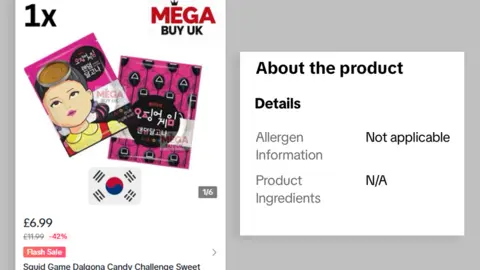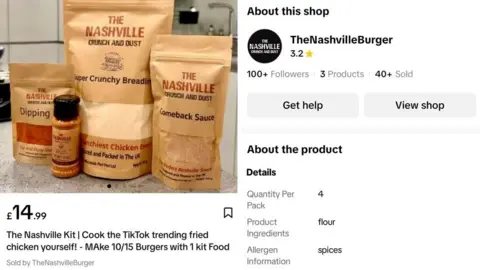TikTok Shop food listings 'putting people at risk'
TikTok users are selling food without listing allergen information, the BBC has found.
Listings on TikTok Shop show people selling snacks and sweets without highlighting they contain one of the 14 main allergens that UK businesses are legally required to declare.
When the BBC brought these listings to TikTok's attention, it deleted them and said: "TikTok Shop is committed to providing a safe and trustworthy shopping experience."
Simon Williams, chief executive of Anaphylaxis UK, warned allergy suffers: "If the ingredient and allergen information isn't there, don't buy it. You're putting your life in grave danger."
A TikTok spokesperson said: "We have policies and processes in place with our sellers to ensure the safety of food and beverages sold on our platform and we will remove products that breach these policies."
However, it is currently possible to sell food on TikTok Shop without providing any ingredient or allergy information.
The BBC found one seller, Mega Buy UK, selling a sweet treat related to the popular Netflix show Squid Game and listed the ingredients and allergens as "not applicable".
 Getty Images
Getty ImagesAnother UK-based seller called The Nashville Burger listed a burger-making kit that contained milk - one of the 14 allergens food businesses in the UK are required to declare on labels. It also contained wheat - which should be listed as an allergen under cereals containing gluten.
However, on TikTok Shop, the allergen information was given as "spices" and the ingredient description simply said "flour".
The BBC also found a seller called UK Snack Supply advertising lollipops and crisps with no ingredient or allergen information.
TikTok has deleted the adverts the BBC highlighted, but all three companies are still on TikTok Shop selling other products without providing full allergen information.
The BBC has approached all of these sellers for comment but could not independently verify that the sellers were all listed in the UK.
However, allergy charities say regardless of where the firms are based more should be done to keep consumers safe.
 TikTok
TikTokTikTok is a place where food trends go viral - from the pickle challenge which involved eating a hot pickle wrapped in a fruit roll-up - to Dubai chocolate which sparked a shopping frenzy.
And while users consume the videos TikTok has also become a platform to buy and sell a bite of the action.
Kate Lancaster's two children both have milk allergies and she regularly posts advice on TikTok as The Dairy Free Mum.
She thinks TikTok has a responsibility to ensure all products sold on its shopping platform meet safety and labelling standards.
"It's completely unacceptable and really worrying. Failing to provide ingredient information is potentially very dangerous, and it feels like a complete disregard for the safety of those living with food allergies," she said.
 Kate Lancaster
Kate LancasterTanya Ednan-Laperouse co-founded The Natasha Allergy Research Foundation in the name of her daughter who died after an allergic reaction to a Pret a Manger sandwich.
She said: "'TikTok should be responsible for ensuring that all their UK food sellers meet legislative requirements to sell food products on their app.
"Any that don't should be immediately removed from the app and investigated, but ideally this should not happen if their checks and balances are rigorous and in place."
After her daughter's death, new safety rules, known as "Natasha's Law", were introduced which require full ingredient and allergen labelling on all food made on premises and pre-packed for direct sale.
'Putting people at risk'
Kate believes TikTok is allowing sellers to "swerve" basic food labelling requirements as the app allows people not to list any ingredients at all and thinks the platform should penalise those who don't provide the correct information.
"Since Natasha's Law has come into effect I feel that, in general, allergy labelling has improved, but it's frightening that a huge platform like TikTok does not have adequate measures to ensure that labelling is in place," she said.
"The thought of someone with a food allergy, or an allergy parent, buying items that they assume are safe, when in fact they may not be, is really scary."
Mr Williams from Anaphylaxis UK says the ultimate responsibility lies with the seller but does think TikTok could do more.
"At the moment it's being used as a platform to sell things that may not be safe. They [TikTok] do need to do more," he said, "There's a lot of people making a lot of money, great side hustle, but they're putting people at risk."
Dr James Cooper, deputy director of food policy at the Food Standards Agency (FSA), which is responsible for food safety in England, Wales and Northern Ireland, said: "Wherever people buy their food, it needs to be safe and what it says it is.
"Food businesses in the UK must be registered with their local authority and follow food law. All food businesses have a legal responsibility to sell safe food and provide allergen information."
The FSA website says that if food is sold online or over the phone through "distance selling" then allergen information must be provided at two different stages in the order process.
This usually means providing allergy information in the online description and then also on the packaging so a buyer has two opportunities to check if their allergy could be triggered.

Get our flagship newsletter with all the headlines you need to start the day. Sign up here.
